Did you know that 70% of dating app users say the matching algorithm greatly influences their chances of finding a meaningful connection?
In the modern world, finding love often begins with a swipe on a dating app.
But have you ever wondered how these apps choose who appears on your screen? That's where the term “ dating app algorithm” comes.
The dating app algorithm is the real key that determines your potential matches, working tirelessly behind the scenes to maximize compatibility and spark meaningful connections.
If you are someone who is exploring all about dating apps, knowing how dating app algorithms work will be a secret weapon to understanding how user matches.
What is a Dating App Algorithm?
Many of us may wonder what exactly is Dating app algorithm. It is an algorithm that is used to help people find like-minded people, a love partner or the kind of relationship they are looking for.
The idea of using dating app algorithms to spark romance isn't as modern as it seems. It actually dates back to the 1960s, when researchers started building compatibility models based on psychology.
-
- Fast-forward to 1995, Match.com entered the scene using basic algorithms focused on demographics and interests.
- But the real shake-up came in 2012 with Tinder, which swapped lengthy profiles for a swipe-right culture that prioritized instant attraction. While it was fast and fun, it introduced a new challenge: how to make meaningful matches based on simple swipes.
That's when dating apps began tapping into machine learning, analyzing behaviors like likes, messages, and response times to improve match accuracy over time.
Today's dating algorithms don't just pair people; they learn, adapt, and grow smarter with every swipe.
Fast forward to today, when investor no longer wants basic algorithms but are looking to create a dating app with AI algorithms to make users have the best experience.
How Do Dating App Algorithms Work?
If you've ever asked, "How do dating app algorithms work?", you're not alone. It’s something most of us wonder after a streak of weird matches or one surprisingly perfect one.
Dating apps use a mix of behaviour analysis, machine learning, location tracking, and some serious behind-the-scenes scoring to serve up your potential soulmate (or at least your next coffee date).
Let’s unpack what’s really going on when you swipe.
► Behaviour Tracking (Yep, You’re Being Watched, in a Good Way!)
-
- Every like, swipe, pause, or chat you make is a clue. Dating app algorithms track how you interact and build a digital version of your “type.”
- From appearance preferences to conversation styles, even how long you linger on certain profiles, it’s all data.
- Over time, several dating app algorithms learn your unique behaviour and use it to improve future matches. The more you use the app, the better it knows you, sometimes better than your friends do!
► Machine Learning = Smarter Swipes
-
- Wondering how dating app algorithms work after a few oddly perfect matches? It’s thanks to cutting-edge AI development services powering machine learning behind the scenes.
- These smart systems evolve as you do. If you suddenly shift from liking dog lovers to travel junkies, the algorithm pivots too.
- It’s basically a digital wingman that keeps learning what you like, helping serve matches that align with your changing tastes and moods.
► Match Scoring: It’s Not Just Random
-
- One of the coolest things about dating app algorithms is how they score profiles based on your compatibility.
- This includes shared interests, mutual friends, proximity, personality traits, and even the likelihood of having a good convo.
- So no, you’re not just seeing random faces. You’re seeing people the dating app thinks you’re most likely to connect with, and possibly match with IRL.
► Location & Timing Matter
-
- Several dating app algorithms don’t just focus on who you’d like, they also care about when and where you’re swiping.
- If two people are usually online around the same time, or live within the same few miles, the algorithm may prioritize that match.
- It’s about making love more convenient in real-time. Because let’s be real: nobody wants to date someone five time zones away.
► Popularity & Activity Boosts Visibility
-
- Ever wonder why your profile suddenly got more attention? It’s likely because you’ve been active, and the dating app algorithm noticed.
- Apps reward people who engage regularly, reply to messages, and swipe meaningfully.
- High engagement = higher visibility. So being active (without spamming) boosts your profile and gives you better match opportunities. Win-win.
Which Dating App Have the Best Algorithm?
Alright, now you know how the magic happens. But the next question is: Which dating app does it best?
Not all dating apps are created equal. Some lean on deep data, others focus on shared interests, and a few even use artificial intelligence to fine-tune your matches.
Let’s break down which dating apps have the most impressive matchmaking tech, and why they might be the perfect fit for you:
1. Tinder – The Swipe King with Smart Learning
Tinder’s algorithm has evolved way beyond just “hot or not.”
It uses your swiping behaviour, response times, and activity levels to learn what you’re looking for, even if you don’t know yet.
So, which algorithm does Tinder uses, Initially, when Tinder was launched in 2012 it used Elo Tinder Rating, The concept of Elo score originally aimed to rank individuals higher on the basis of attractiveness.
As of right now, the firm has been vocal about not using Elo anymore instead, it is working on Tinder vault. Although, it is still in its testing phase, we might see something new pretty soon.
The popularity and newness has inspired many people to create an app like Tinder, are you one of them?
2. Hinge – Built to Be Deleted (And That’s a Good Thing)
Who doesn’t want to create an app like Hinge? If you are also exploring the idea, then you should know about the algorithm of the Hinge dating app.
Hinge dives deeper into data. It asks specific questions, then uses your answers (and your likes) to recommend matches who align with your values and lifestyle.
Its “most compatible” feature is scary accurate sometimes, it’s like your therapist teamed up with your BFF to pick a date.
So, Hinge’s algorithm is inspired by Nobel-prize winning Gale-Shapley algorithm.
But here’s the cool part: it’s not just trying to show you people you might like, it’s also thinking ahead to who’s most likely to like you back.
It looks at everything from your profile answers and dealbreakers to who you’re liking or skipping, and even who you end up swapping numbers with.
It’s playing matchmaker with some serious brainpower.
3. Bumble-Empowering Matches with a Human Touch
Bumble has changed the dating scenario by putting women in control, but its algorithm is no slouch.
It ranks potential matches by quality interactions, not just swipes. It is kind of believed that it uses the same ELO rating system as Tinder.
Bumble’s algorithm is based on behaviour and engagement- it learns from how you swipe, who you message and how active you are.
Plus, if you're active and respectful, Bumble rewards you with better visibility. Karma, coded. This is why making an app like Bumble is said to be revolutionary.
4. OkCupid- Matchmaking Meets Math Nerds
With deep-question quizzes and percentage-based compatibility, OkCupid’s algorithm is a data-lover’s dream.
OkCupid's algorithm is based on questions and answers. It cross-references answers to give you thoughtful matches based on what really matters to you- from values to lifestyle choices.
The more questions you answer, the smarter the algorithm gets at finding truly compatible matches.
It's like having a digital matchmaker who actually listens to what you care about most.
5. Coffee Meets Bagel – Quality Over Quantity
This app takes a curated approach. Instead of endless swipes, it serves you a few high-potential matches each day based on mutual interest and behaviour.
The algorithm of Coffee Meets Bagel classifies selected preferences as ‘must-haves’ in the suggestions.
Subsequently, it will utilize additional information, including your interests, social circles, education levels, and more, to make better decisions about your ideal bagels.
6. eHarmony – The OG of Compatibility Matching
Have you ever heard of eHarmony? You must have.
The eHarmony algorithm is built on user answers from detailed assessments to match you with people who align with your core values and long-term compatibility, not just surface-level attraction.
Instead of focusing on looks or quick likes, their unique algorithm of dating apps digs deeper to find meaningful relationships.
7. Iris- AI-powered and Uniquely Personal
Launched in 2019, Iris Dating doesn’t just guess who you’ll find attractive; it learns it.
Iris uses a unique AI-powered algorithm called AttractionDNA™. Yep, it’s as futuristic as it sounds. Through a cool three-step training phase, you rate photos and the algorithm starts figuring out your exact “type”, like a dating psychic, but way more accurate.
The more you use it, the smarter it gets at showing you people you’ll actually want to meet. No more endless swiping through profiles you’re not into.
Bonus: Iris even uses ChatGPT to help you write your bio, so you can skip the awkward intros and actually sound like the charming human you are.
It’s like having a super-intuitive, AI-powered wingman who just gets your vibe.
When thinking about which dating app uses the best algorithm? Well, the answer is it depends.
Such as, Tinder is great if you want fast, swipe-based matches driven by behaviour and activity, while eHarmony uses deep psychological assessments to match people and for advanced algorithms you can try Iris.
With that being said, if you want to build a dating app that competes with these giants? Then you should ensure your dating app technology is more personal, smarter and Gen-Z approved.
What to Consider While Choosing a Dating App Algorithm?
Building a dating app that truly stands out means making smart choices about the core tech powering it, especially the algorithm. After all, the heart of every great dating platform is how well it connects people.
When you’re designing or investing in the next big thing, here are some key factors to keep in mind about dating algorithms to stay ahead of the curve.
1] Matchmaking Style: Depth or Speed?
Think about whether your app’s algorithm will focus on deep compatibility or quick-fire matches.
Some users want thoughtful pairings based on personality and values, while others prefer fast, swipe-driven fun.
Balancing this can help you navigate common dating app challenges and attract a broader audience.
2] User Control vs. Automation
Algorithms of dating apps vary in how much they let users steer the experience.
Some offer heavy filters and hands-on controls, while others rely more on AI to surprise users with matches they didn’t expect.
Deciding this impacts engagement and user satisfaction, a crucial factor in today’s changing landscape.
3] Leveraging Rich Data Sets
The smartest dating app technology gathers and processes a ton of data, from swipe behaviour and messaging patterns to quiz responses and even timing.
The deeper the data, the better your algorithm can predict who will actually connect. This level of personalization can give your app a serious edge.
4] Prioritizing Mutual Interest and Activity
One major hurdle in many apps is ghosting or one-sided matches.
Incorporating metrics like mutual interest and user activity into your algorithm helps ensure real connections happen.
This not only improves user experience but also keeps your platform vibrant and sticky.
5] Geolocation and Real-Time Interaction
If you are planning to start an online dating business, location and timing might seem simple, but they’re game-changers.
The algorithm should consider proximity and when users are active to serve relevant matches, making dating feel natural and convenient.
This taps directly into key dating app challenges around user retention and satisfaction.
6] Adaptability and Machine Learning
Your algorithm should evolve as users interact more with the app.
Utilizing AI and machine learning means the app can learn and refine suggestions, making each experience uniquely tailored.
This is one of the hottest dating app trends shaping the future of matchmaking.
Choosing the right dating app algorithm isn’t just a tech decision, it’s a strategic move that can define your platform’s success.
Get this right, and you’ll build an app that’s not just another face in the crowd but a real contender in the growing world of dating app technology.
Ready to create an algorithm that changes the game?
How JPLoft Can Help You Develop a Successful App of Your Dreams?
Turning your app idea into reality takes more than just coding; it requires expertise, creativity, and strategy.
That’s where JPLoft, the best dating app development company, comes in.
They specialize in building custom apps with smart dating algorithms, seamless design, and scalable tech.
Whether it’s a dating app or any mobile solution, JPLoft’s user-focused approach ensures your app stands out and keeps users engaged.
From development to launch and ongoing support, they guide you every step of the way. Ready to build an app that truly connects? JPLoft makes it happen!
Conclusion
Building a dating app that truly clicks with users means understanding the magic behind the scenes, those clever dating app algorithms that turn swipes into sparks.
From smart behaviour tracking to AI-powered matchmaking, the future of dating apps is all about personalization and real connections.
Whether you’re dreaming of launching the next big hit or just curious how your favourite app works, knowing what makes these dating app algorithms tick is key.
So, dive in, innovate, and remember: a great algorithm doesn’t just match profiles, it creates stories. Ready to make love digital? The possibilities are endless!
FAQs
It’s a smart system that analyzes your behaviour, preferences, and data to suggest matches you’re most likely to connect with.
AI learns from your swipes, messages, and activity to improve suggestions, adapting as your tastes and behaviour change.
While no algorithm guarantees love, it greatly improves your chances by showing more compatible matches based on real data.
Proximity helps the app suggest matches near you, making it easier and more convenient to meet in real life.
Algorithms evolve continuously, especially with machine learning, to stay smarter and more relevant as user patterns shift.





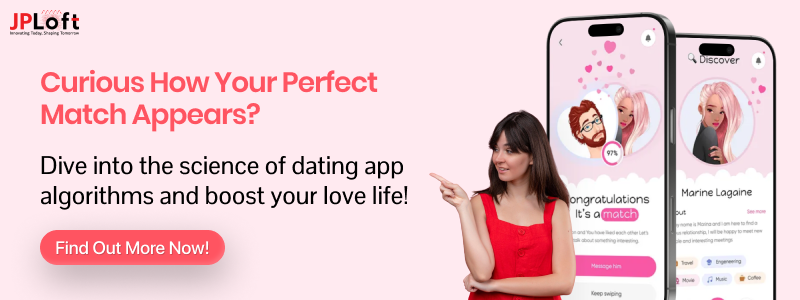
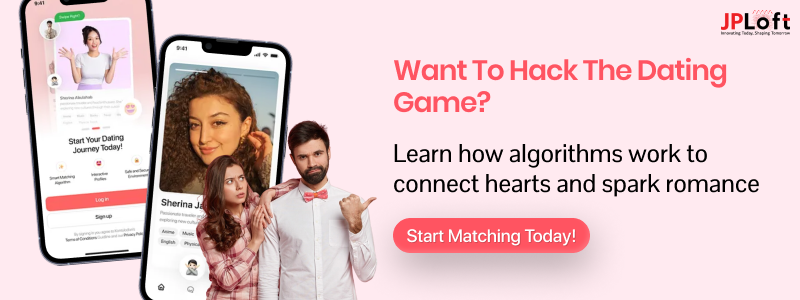

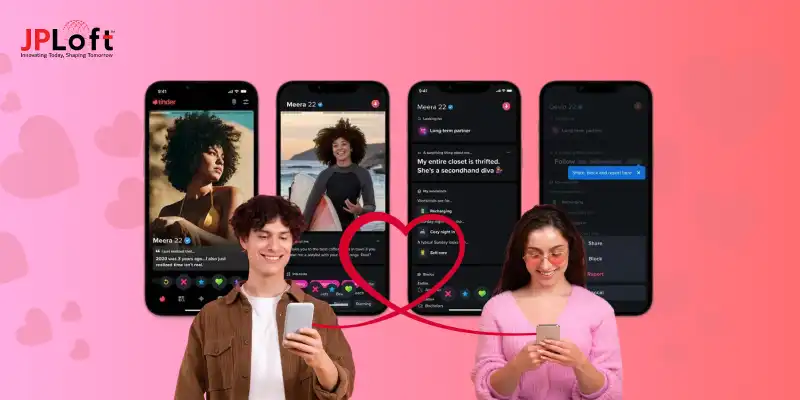
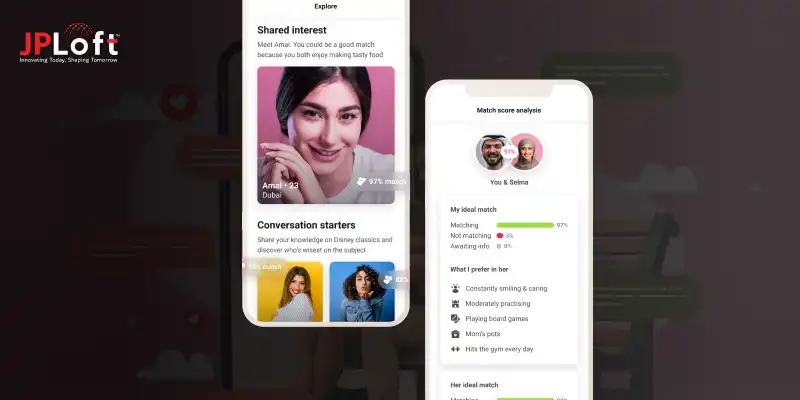
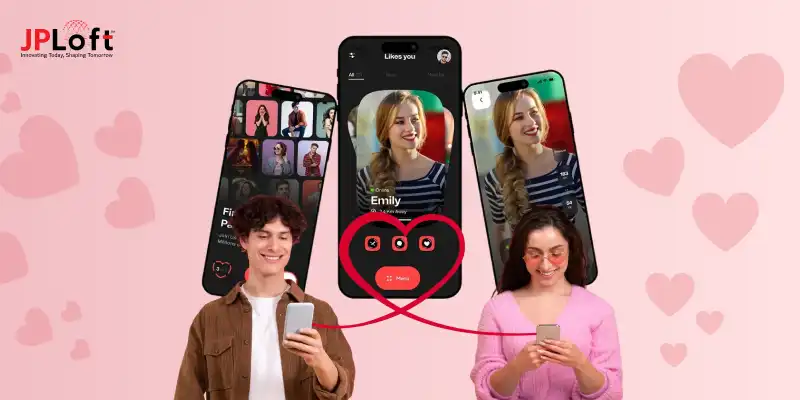


Share this blog